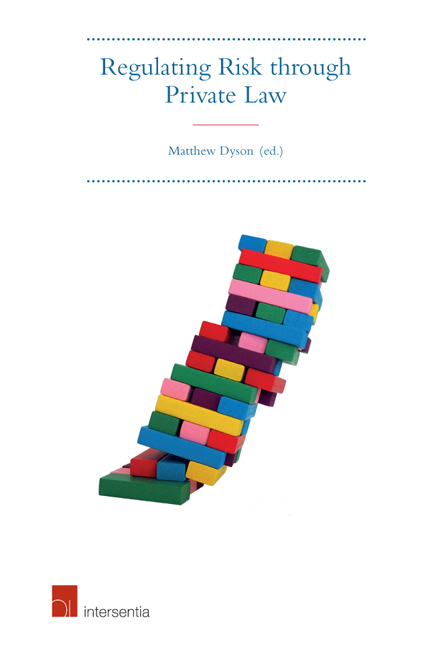Book contents
- Frontmatter
- Preface
- Contents
- Table of Cases
- List of Contributors
- Chapter 1 Introduction
- Part I Risk Overviews
- Chapter 2 Risk and english tort law
- Chapter 3 Risk and French Private Law
- Chapter 4 Risk in Swedish Tort Law: Of Models and Muddles
- Chapter 5 Risk and Italian Private Law
- Chapter 6 Regulating Risk Through Private Law: The Spanish Approach
- Chapter 7 How Dutch Tort Law Responds to Risks
- Chapter 8 Risk and Chilean Private Law
- Chapter 9 Regulating Risk Through Private Law: South Africa
- Chapter 10 Risk and Brazilian Private Law
- Part II State of the national art on risk
- Index
- About the Editor
Chapter 3 - Risk and French Private Law
from Part I - Risk Overviews
Published online by Cambridge University Press: 13 October 2018
- Frontmatter
- Preface
- Contents
- Table of Cases
- List of Contributors
- Chapter 1 Introduction
- Part I Risk Overviews
- Chapter 2 Risk and english tort law
- Chapter 3 Risk and French Private Law
- Chapter 4 Risk in Swedish Tort Law: Of Models and Muddles
- Chapter 5 Risk and Italian Private Law
- Chapter 6 Regulating Risk Through Private Law: The Spanish Approach
- Chapter 7 How Dutch Tort Law Responds to Risks
- Chapter 8 Risk and Chilean Private Law
- Chapter 9 Regulating Risk Through Private Law: South Africa
- Chapter 10 Risk and Brazilian Private Law
- Part II State of the national art on risk
- Index
- About the Editor
Summary
INTRODUCTION
The concept of risk has been widely considered by law academics and in doctoral theses in various fields of French law. Risk has been discussed extensively in contract law, where we find a doctrine of risk, and in the law. of evidence. The concept of risk is oft en examined in articles dealing with professional activities, particularly the ‘criminal law risks’ or the ‘legal risks’ those professionals face. Discussions relating to risk clearly play a central role in environmental law, where risk and the precautionary principle (as a response to risk) have been, and continue to be, the subject of considerable academic study. Health risks are also a major concern for public authorities. A government website promotes the prevention of major risks threatening public health, in particular those posed by chemical or bacteriological contamination of water or air. The concept of risk is omnipresent in public law, particularly in rules imposing no-fault liability on the state for public bodies based on the principle of risk. In urban planning law, prevention plans are defined for risks posed by natural phenomena such as storms and flooding.
Risk thus permeates wide areas ofFrench law. However, risk can be argued to have played its most significant role in the area of tort law, with respect both to debates about the foundations of tort liability and to the development of substantive liability rules.
THE DOCTRINE OF RISK AND THE CREATION OF STRICT LIABILITY
Historically, the most significant doctrinal theoretical debate about risk concerned the ‘theorie du risque’, the doctrine of risk developed by Saleilles.
At the end of the nineteenth century and in the early twentieth, the use of industrial machinery and motorised transport caused an increasing number of serious accidents, generating more frequent claims for compensation. The Cour de cassation responded by significantly extending the scope of liability. Most famously, in an 1896 decision, an explosion of the steam engine on a tug boat due to a manufacturing defect in the engine caused the victim’ s death. The Court based the defendant’ s liability on article 1384.1 of the Civil Code relating to liability for harm caused by things under one’ s control (as of October 2016, renumbered as article 1242).
- Type
- Chapter
- Information
- Regulating Risk through Private Law , pp. 55 - 78Publisher: IntersentiaPrint publication year: 2018
- 18
- Cited by



